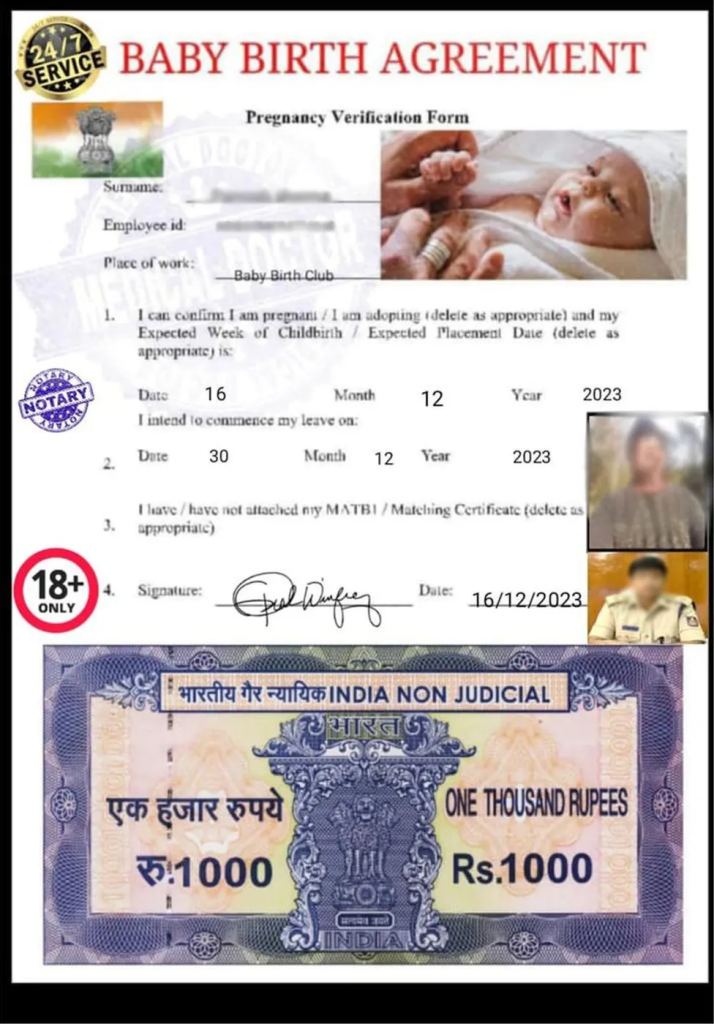As cyber scams go, this one is rather unique.
In early December Mangesh Kumar (name changed) was scrolling on Facebook when he came across a video from the “All India Pregnant Job Service” and decided to check it out. The job sounded too good to be true: money – and lots of it – in return for getting a woman pregnant.
It was, of course, too good to be true. So far, the 33-year-old, who earns 15,000 rupees ($180; £142) per month working for a wedding party decoration company, has already lost 16,000 rupees to fraudsters – and they are asking for more.
But Mangesh, from the northern Indian state of Bihar, is not the only person to fall for the scam.
Deputy superintendent of police Kalyan Anand, who heads the cyber cell in Bihar's Nawada district, told the BBC there were hundreds of victims of an elaborate con where gullible men were lured to part with their cash on the promise of a huge pay day, and a night in a hotel with a childless woman.
So far, his team have arrested eight men, seized nine mobile phones and a printer, and are still searching for 18 others. But finding the victims has proved more tricky.
“The gang has been active for a year and we believe they have conned hundreds of people, but no-one has so far come forward to complain, possibly because of shame,” he explained.

The BBC has managed to speak to two of the victims – one said he had lost 799 rupees, but didn't want to discuss details. Mangesh was much more forthcoming and, over the course of several phone calls, revealed how he fell prey to the scammers.
“Ten minutes after I'd clicked on the video, my phone rang. The man asked me to pay 799 rupees if I wanted to register for the job,” he told me. The caller – Mangesh calls him Sandeep sir – told him that he would be working for a company in Mumbai and that once he had signed up, he would be sent details of the woman he would have to impregnate.
They offered him half a million rupees – almost three years wages – just to have sex with the woman and promised further reward of 800,000 rupees if she conceived.
“I'm a poor man, I desperately need money so I believed them,” the father of two young boys told me.
Over the next couple of weeks, Mangesh was asked to fork out more than 16,000 rupees – 2,550 rupees to obtain some court documents, 4,500 as safety deposit and 7,998 rupees as Goods and Services Tax (GST) on the money he was going to get.
He's shared all the receipts and the fake court papers with me – the official-looking document has his name and carries his photograph along with that of a man in police uniform. In big capital letters on top, it says “Baby Birth Agreement” and the fine print below reads “pregnancy verification form”.
The signature at the end of the document resembles one used by US talk show host Oprah Winfrey.
The scammers kept him interested by sending him photos of “seven-eight women”, asking him to choose the one he would like to impregnate. “They said they would book a hotel room in the town where I lived and I would meet the woman there,” he said.
When Mangesh kept asking for the promised money, they sent him a receipt saying they had credited his bank account with 512,400 rupees but the money was on hold and would be paid after he'd paid 12,600 as income tax.
By then, Mangesh says, he had lost an entire month's salary and told them that he couldn't pay any more and asked for a refund.
“But Sandeep sir refused and when I got angry, he told me that since my bank account showed a credit of 500,000 rupees, income-tax authorities would raid my home and arrest me.
“I'm a poor labourer, I'd lost a month's pay and I didn't want to get tangled in any criminal case. I was so afraid that I switched off my phone for 10 days. I switched it back on only a few days ago,” he told me, adding that he initially also took me to be a part of the scammers' gang.
According to DSP Anand, the men behind the scam are educated – some are even graduates – and they know how to work mobile phones, laptops and printers. The victims, on the other hand, are from all over India and most have little education.
Mangesh says it didn't strike him that this could be a con because “Sandeep sir” had sent him copies of his identity cards, including one which identified him as an Indian army soldier. He also believed that the display photo on the caller's WhatsApp – showing an attractive foreign woman cradling a newborn in her arms – was genuine.
“You tell me how can you not believe that photo?” he asks.
The problem is, cyber law expert Pavan Duggal explains, that people in India, “are by and large very trusting and rarely do an independent verification of information on the internet”, bolstered by an overconfidence in their safety.
However, the methodology of the scam in Nawada, he says, “is very novel”.
“The scammers lured them with promise of free money and free sex which is a deadly combination. In situations like these, prudence often takes a backseat.”
But with the advent of Covid-19 – when cellular and net banking became the norm – Mr Duggal says “the golden age of cyber crime began” and warns that “it will go on for decades”. As cyber criminals come up with newer, innovative and more customised offerings, India will have to work harder to protect people like Mangesh from falling prey to scammers, he adds.
“The government needs to do a lot more to create awareness through radio and television broadcasts since people trust the government more.” But the government alone cannot reach each one of India's 1.4 billion people.
“The numbers are overwhelming. And depending on the government alone will take a very long time and the Indian economy will continue to bleed. So the government must give incentives to the private sector to pitch in,” he says.
The scammers, meanwhile, still haven't given up on Mangesh. While on a call with me last week, he rang off saying “the madam” was calling. This, he later explained to me, was the woman he had been promised a meeting with.
On Sunday night, he told me he had been speaking to her almost daily. She's now telling him that “Sandeep sir” is the real conman and he's pilfered most of the 500,000 rupees Mangesh had been promised, but that he can still get 90,000 rupees if he pays 3,000 rupees as GST.
“I told her I'm broke. I pleaded with her to return my money but she said it won't be possible. I wish she would at least return 10,000 rupees,” he told me.
I ask him if he still trusts the scammers.
“I really don't know what to do now. I've lost an entire month's pay and have not been able to send any money to my family in Bihar. My wife is very angry and no longer speaks to me.”
He's angry that “Sandeep sir” no longer takes his call.
“Those who cheated me must get the maximum punishment. I do backbreaking work the whole day for 500 rupees. I know I made a huge mistake. But what they did with me is so wrong.”
— CutC by bbc.com


